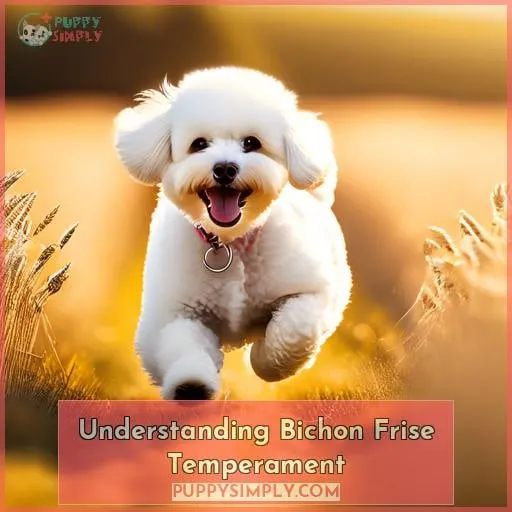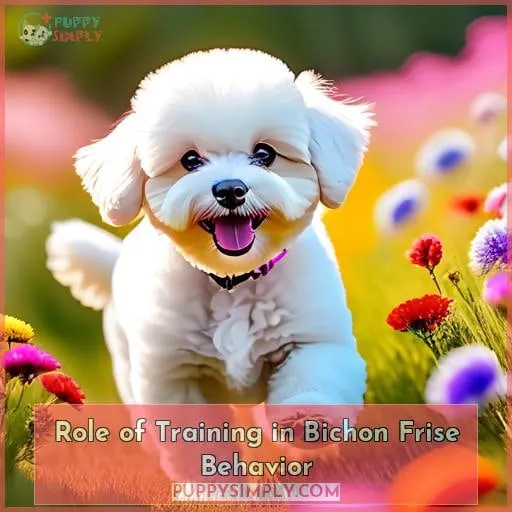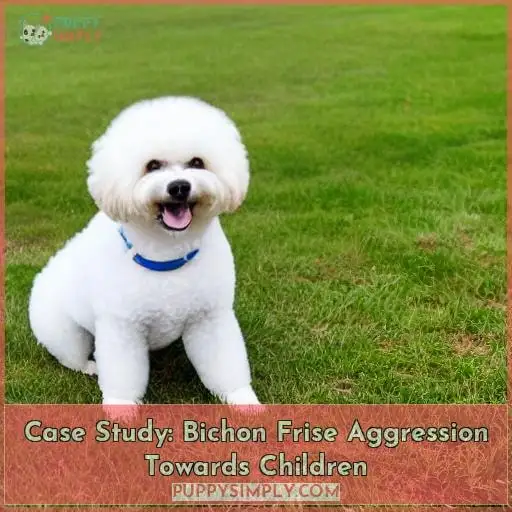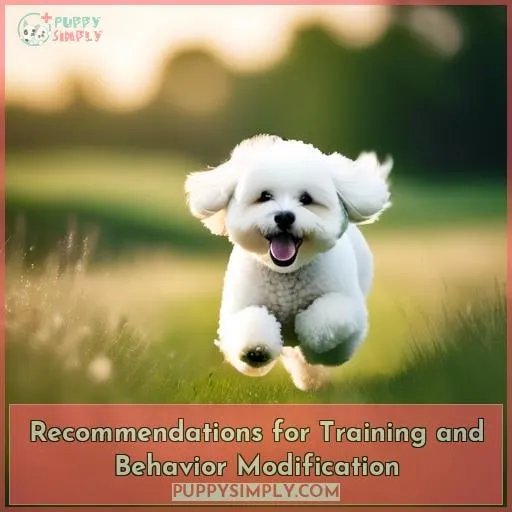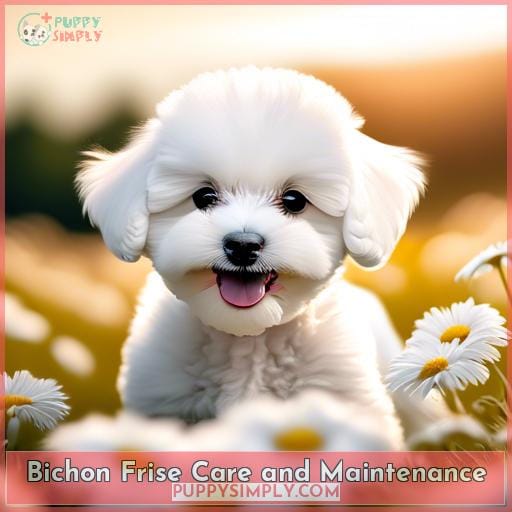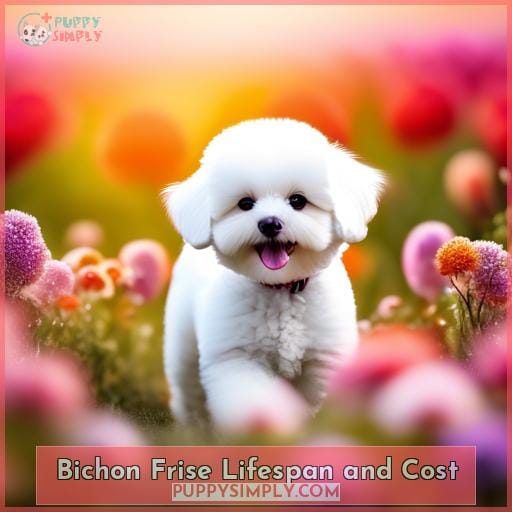This site is supported by our readers. We may earn a commission, at no cost to you, if you purchase through links.
 You’ve heard the murmurs about Bichons being aggressive. You’re wondering, Is there any truth to it? Let’s embark on a journey to uncover the temperament of this beloved breed.
You’ve heard the murmurs about Bichons being aggressive. You’re wondering, Is there any truth to it? Let’s embark on a journey to uncover the temperament of this beloved breed.
We’ll explore the factors that shape their behavior, from training and environment to health and genetics. We’ll delve into the secrets behind their actions, debunking myths and revealing the true nature of the Bichon Frise.
Training and Environment
Proper training and a positive environment are crucial for a well-behaved Bichon. Socialization with other dogs and humans helps prevent aggression.
Health and Genetics
Health issues and genetic predispositions can contribute to aggressive behavior. Regular checkups and responsible breeding practices help ensure a healthy, well-behaved dog.
Debunking Myths
The myth that all Bichons are aggressive is false. With proper care and training, they are typically friendly and loving companions.
Revealing the True Nature
Bichons are known for their intelligence, loyalty, and affectionate nature. They make excellent companions for families with children and other pets.
In conclusion, Bichons are not inherently aggressive. With proper care, training, and socialization, they are loving and loyal companions.
Table Of Contents
- Key Takeaways
- Understanding Bichon Frise Temperament
- Role of Training in Bichon Frise Behavior
- Environmental Factors Influencing Bichon Frise Behavior
- Health and Bichon Frise Aggression
- Bichon Frise and Separation Anxiety
- Case Study: Bichon Frise Aggression Towards Children
- Inherited Vs. Environmental Factors in Bichon Frise Aggression
- Recommendations for Training and Behavior Modification
- Bichon Frise Care and Maintenance
- Bichon Frise Lifespan and Cost
- Frequently Asked Questions (FAQs)
- Are bichons born aggressive or is it learned behavior?
- How can I prevent my bichon from becoming aggressive towards children?
- How do I discipline my bichon for aggressive behavior?
- Are there specific training methods or techniques that are effective in curbing aggression in bichons?
- What are some common health issues that may contribute to aggression in bichons?
- Conclusion
Key Takeaways
- Proper training, a positive environment, and socialization can prevent aggression.
- Bichons are naturally affectionate and sociable, but training and environmental factors shape their behavior.
- Health issues, weight problems, and an improper diet can contribute to aggression.
- Regular checkups, proper care, and maintenance can promote well-being and reduce aggressive tendencies.
Understanding Bichon Frise Temperament
As a pet owner, you can appreciate bichons’ inherent friendliness and loving nature.
However, their alertness can lead to territorial barking, and you should be aware of the potential for aggression when they feel their space is being invaded.
Understanding these traits can help you create a harmonious environment for your bichon.
Natural Affection and Sociability
You’ll find the Bichon Frise to be a naturally affectionate and sociable companion.
Their playful nature makes them delightful playmates, while their territorial barking ensures you’re always aware of strangers.
Centuries of companionship have ingrained friendliness into their DNA, making them ideal family pets.
Their innate friendliness far outweighs any potential for aggression.
Alertness and Territorial Behavior
The Bichon Frise’s alertness and territorial behavior make it an attentive watchdog.
It barks to alert you of strangers, but this vigilance can sometimes lead to stranger reactivity.
They may guard their food, toys, or territory from other dogs, exhibiting resource guarding and dog-to-dog aggression.
Understanding these instincts can help you manage your Bichon’s behavior, preventing escalation and fostering harmony in your household.
Historical Role as Companion Dogs
Their history as companion dogs has shaped their amicable nature.
For centuries, Bichons have been cherished as lapdogs, prized for their affectionate and playful demeanor.
Their popularity soared in royal courts and noble households, cementing their reputation as charming companions.
While their temperament can vary, they generally thrive in apartments and make excellent pets for families of all sizes.
Their playful and affectionate nature makes them a joy to have around, living up to their historical role as man’s best friend.
Role of Training in Bichon Frise Behavior
Training plays a vital role in shaping your Bichon Frise’s behavior.
Proper training from puppyhood, using positive reinforcement techniques and focusing on obedience, socialization, and positive behavior, can help prevent aggression and promote a well-behaved, happy dog.
Importance of Puppy Socialization
Puppy socialization is key to developing a well-rounded Bichon Frise.
Early intervention reduces fear and aggression, leading to a more confident and adaptable companion.
Positive interactions with people and animals create a foundation for good behavior.
Establish a consistent routine to provide structure and security.
Prevent separation anxiety by gradually increasing alone time.
Enroll in obedience classes to reinforce good behavior and curb unwanted tendencies.
Regular vet check-ups ensure health issues don’t trigger aggression.
Positive Reinforcement Techniques
Applying positive reinforcement techniques will yield better results than punishment when training your Bichon Frise.
Create a reward system that motivates your dog with treats, praise, or play.
Consider clicker training to mark desired behaviors and shape them over time.
Treat motivation can be a powerful tool in encouraging good behavior and discouraging unwanted actions.
Focus Areas in Training
In training your Bichon Frise:
- Focus on obedience, socialization, and positive behavior reinforcement.
- Emphasize obedience commands like sit, stay, come, and heel to establish control and structure.
- Use crate training to provide a safe space and prevent destructive behaviors.
- Implement socialization methods to introduce your Bichon to different people, animals, and environments, reducing fear and aggression.
- Employ positive reinforcement techniques like treats, praise, and play to reward good behavior and discourage undesirable actions.
This comprehensive approach will shape your Bichon’s temperament, promoting harmony and obedience.
Environmental Factors Influencing Bichon Frise Behavior
You can help your Bichon Frise thrive by:
- Providing a stable and loving home.
- Encouraging positive interactions with other animals.
- Giving them plenty of mental and physical stimulation.
Creating a harmonious environment for your Bichon Frise is essential for their well-being and happiness.
Importance of a Stable Home Environment
Create a stable home environment to promote calmness and minimize anxiety in your Bichón Frisé.
Their sensitive nature thrives on routine and consistency, so stick to consistent feeding, walking, and play schedules.
Ensure your family members treat the dog with respect and affection, avoiding rough play or punishment.
A harmonious household reduces stress and fosters a well-behaved, loving companion.
Interactions With Other Pets
How do interactions with other pets influence your Bichon Frise’s behavior?
Nurturing positive interactions with other pets is crucial.
- Set up playtime routines and a socialization schedule to promote friendly encounters.
- Designate safe play areas where your Bichon Frise can engage in supervised play.
- Encourage shared activities like walks or fetch sessions to foster companionship and reduce the risk of aggression stemming from isolation or boredom.
Mental and Physical Stimulation
Alongside positive interactions with other pets, providing your Bichon Frise with ample mental and physical stimulation will help prevent boredom and destructive behavior.
Insufficient exercise can lead to pent-up energy and frustration, potentially triggering aggression.
Create an enriching indoor environment with interactive toys, puzzles, and games to keep your Bichon’s mind active.
Positive interactions with people, both adults and children, can also provide mental stimulation and reduce aggression.
Health and Bichon Frise Aggression
Your Bichon Frise’s aggression might stem from underlying health issues causing irritability.
Regular check-ups catch problems early, preventing behavioral changes.
Maintaining a healthy weight and diet supports their well-being, reducing aggression triggers.
Impact of Underlying Health Issues
- You’ll need to be aware of how underlying health issues can cause irritability and aggression in your Bichon Frise.
- Allergies can lead to skin irritation and discomfort, causing your Bichon to lash out.
- Health screening before breeding helps reduce the risk of inherited conditions.
- Neutering can sometimes reduce aggression, but it’s not a guarantee.
- Pain from an injury or illness can make your Bichon more likely to snap.
- Regular checkups with your vet can catch health issues early, preventing aggression.
Role of Regular Health Check-ups
By scheduling regular health checkups with your veterinarian, you can identify and address any underlying health issues that may be causing aggression in your Bichon Frise.
Regular health checkups are crucial for detecting potential problems early on, allowing for prompt treatment and preventing the escalation of aggression.
The frequency of these checkups should be determined in consultation with your veterinarian, considering factors like your dog’s age, overall health, and any specific concerns you may have.
Regular health checkups provide peace of mind, ensuring that your Bichon Frise’s aggression isn’t a result of an underlying health condition.
Importance of a Healthy Weight and Diet
Maintaining your Bichon Frise’s healthy weight and diet helps prevent aggression by addressing underlying health problems and providing essential nutrients.
Obesity can worsen joint pain, increasing irritability. An improper diet can lead to nutrient deficiencies, affecting mood and behavior.
By offering a balanced diet and maintaining a healthy weight, you’re not only caring for their physical well-being but also their emotional stability.
Bichon Frise and Separation Anxiety
As a Bichon Frise owner, you’re likely aware of their affectionate and sociable nature.
However, you may be concerned about their potential for separation anxiety.
This article will explore the signs and consequences of separation anxiety in Bichons and provide strategies for managing it effectively.
Signs and Consequences of Separation Anxiety
Beyond health issues, watch out for signs of separation anxiety, like destructive behavior and excessive barking when you’re away.
These behaviors stem from your Bichon’s deep-seated fear of being alone.
Prolonged isolation can worsen anxiety, potentially leading to self-harm or destructive behaviors.
Providing companionship, training, and desensitization can help manage separation anxiety and keep your Bichon happy and secure.
Managing Separation Anxiety
To curb separation anxiety, gradually accustom your Bichon Frise to being alone.
Start by leaving it alone for short periods, gradually increasing the duration.
Provide a safe and comfortable space for your Bichon Frise when you’re away.
Engage in regular exercise and playtime to tire your dog out before leaving it alone.
Consider seeking professional help from a veterinarian or animal behaviorist for severe cases.
Never punish your Bichon Frise for separation anxiety, as it will only worsen the problem.
Case Study: Bichon Frise Aggression Towards Children
You’re not alone in dealing with Bichon Frise aggression towards children.
This case study delves into the potential causes:
- Improper socialization
- Underlying health issues
- Inadequate training
It also offers insights into resolving aggression through effective training techniques and behavior modification.
Role of Obedience Classes
While obedience classes can be valuable, they may fall short in tackling aggression issues in Bichon Frises.
Not all classes are created equal; selecting one that specializes in aggression is crucial.
Group training can be overwhelming for aggressive dogs; individual sessions allow tailored attention.
Prong collars, when used correctly, can be a safe and effective tool in training aggressive Bichons.
Impact of Grooming and Health Procedures
One might wonder if there’s a connection between your Bichon’s aggression and:
- Recent grooming experiences
- Anesthesia during a veterinary procedure
The groomer’s concern and suggestion of euthanasia warrant attention.
Moreover, the dog’s obsessive licking of its paw after anesthesia raises questions about:
- Potential health issues
- Obsessive-compulsive behaviors triggered by the experience
It’s crucial to consider these factors when evaluating your Bichon’s temperament and seeking appropriate solutions.
Grooming Experience:
Consider if the grooming process itself or specific techniques caused stress or discomfort to your Bichon, potentially leading to defensive behavior.
Anesthesia Effects:
Explore the possibility of adverse reactions to anesthesia or any underlying health issues that may have been exacerbated during the procedure.
Hot Spot Treatment:
Examine whether the treatment for the hot spot caused irritation or pain, contributing to your Bichon’s irritability and aggression.
Inherited Vs. Environmental Factors in Bichon Frise Aggression
If you’re wondering about the causes of aggression in your Bichon Frise, you’re not alone.
We’ll look at the role genetics and your own behavior may play in your dog’s temperament, so you can understand your companion better.
While genetics contribute to a dog’s temperament, your actions as an owner can either exacerbate or mitigate any inherent tendencies.
Breeder’s Perspective
The breeder’s viewpoint offers insight into whether the aggression stems from genetics or environmental influences.
A responsible breeder will provide information on:
- Temperament variations within the breed
- Any genetic predisposition to aggression
- Strategies for selecting a puppy with a stable temperament
They can also offer guidance on socialization strategies to prevent aggression from developing.
For instance, the breeder might suggest:
- Early socialization with children and other animals
- Obedience training
- Positive reinforcement techniques
Role of the Owner in Dog’s Behavior
You may find yourself examining your role in your dog’s behavior, considering both inherited and environmental factors in its aggression.
Are you providing consistent training with clear boundaries and expectations?
Are you rewarding good behavior and discouraging bad behavior?
Are you meeting your dog’s physical and mental stimulation needs?
Are you providing a stable and nurturing home environment?
Are you seeking professional help if needed?
Reflect on these questions and take responsibility for your dog’s behavior, working towards a harmonious relationship built on trust and respect.
Recommendations for Training and Behavior Modification
If you’re facing aggression issues with your Bichon Frise, consider using a prong collar and crate as training tools.
You might also want to explore self-training options or consult a professional trainer to help you address the underlying causes of your dog’s behavior.
Use of Prong Collar and Crate
Regarding training and behavior modification, adopting a combination approach of using a prong collar and crate can yield promising results.
A prong collar, when used appropriately, can effectively deter unwanted behaviors.
Similarly, crate training instills discipline and provides a safe, comfortable space for your Bichon.
| Training Method | Effectiveness | Recommendations |
|---|---|---|
| Prong Collar Training | High | Seek guidance from experienced trainers to ensure proper fitting and usage. |
| Crate Training | Moderate-High | Choose a crate that allows your Bichon to stand, sit, and turn comfortably. |
| Obedience Classes | Variable | Evaluate class quality and consider private sessions for personalized attention. |
| Dog Dominance Evaluation | Moderate | Consult a behaviorist to assess your dog’s behavior and provide tailored recommendations. |
| Alternative Training Methods | Moderate | Explore positive reinforcement techniques like clicker training and reward-based training. |
Self-training Vs. Professional Training
In addition to self-training options, you may want to consider working with a professional dog trainer to address your Bichon Frise’s aggression issues.
They possess the expertise and experience to:
- Evaluate your dog’s behavior
- Identify underlying causes
- Develop tailored behavior modification strategies
While self-training can be effective, professional training offers:
- A structured approach
- Consistent guidance
- Proven aggression prevention techniques
Ultimately enhancing the chances of successful behavior change.
Bichon Frise Care and Maintenance
If you want your Bichon Frise to be happy and healthy, you need to take proper care of it.
- Regular brushing and combing
- Monthly coat trimming
- Daily exercise
- A balanced diet
Grooming Needs
To keep your Bichon Frise’s coat healthy and beautiful, you’ll need to brush it regularly.
This will help remove dirt, debris, and tangles, and it will also help to distribute natural oils throughout the coat.
If you don’t brush your Bichon Frise regularly, its coat may become matted, which can lead to skin irritation and other health problems.
You should also take your Bichon Frise to a professional groomer every 4-6 weeks for a bath, haircut, and nail trim.
Exercise and Diet
Your Bichon Frise’s daily exercise and balanced diet will ensure their well-being.
Daily walks, fetch, and interactive play fulfill their exercise needs.
A diet rich in lean protein, healthy fats, and essential vitamins keeps them fit.
Don’t forget mental stimulation with puzzle toys and training sessions to keep boredom at bay.
Regular grooming, including brushing and occasional trims, maintains their beautiful coat and prevents mats.
Bichon Frise Lifespan and Cost
Bichon Frises live 12 to 15 years.
Puppies cost between $200 and $2,500, while adoption fees usually run around $150.
Bichon Frise mixes are common.
Other Non-Sporting Group dogs have diverse temperaments.
Average Lifespan
With proper care and attention, your Bichon Frise’s lifespan can reach an average of 12 to 15 years.
While the cost of a Bichon Frise puppy can range from $200 to $2,500, adoption fees typically hover around $150.
If you’re open to a mixed breed, you can find a Bichon Frise mix for a lower cost.
Cost of Ownership
Depending on lineage, you can expect to pay between two and three thousand dollars for a Bichon Frise puppy.
Adoption fees typically hover around a hundred and fifty dollars.
Factor in the first year’s expenses, including vaccinations, neutering or spaying, and supplies, which can reach up to two thousand dollars.
Monthly costs for food, grooming, and pet insurance average a hundred dollars.
Over its lifetime, you’re looking at expenses between fifteen and twenty thousand dollars.
Bichon Frise Mix Breeds and Adoption Options
You can adopt Bichon Frise mixes or purebreds from rescues and shelters at a lower cost.
Mixed breed Bichons often inherit favorable traits from both parents, resulting in diverse temperaments and unique personalities.
Consider adoption as a cost-effective option while giving a loving home to a deserving dog.
Research ethical breeding practices to ensure your new furry friend comes from a reputable source.
Frequently Asked Questions (FAQs)
Are bichons born aggressive or is it learned behavior?
Bichons’ aggression can stem from genetics or learned behaviors.
Inherited traits may contribute, but environmental factors, like improper training or negative experiences, often play a significant role.
Understanding the root cause is crucial for effective behavior modification.
How can I prevent my bichon from becoming aggressive towards children?
With patience and consistency, you can prevent your Bichons’ aggression towards children.
Start training early.
Socialize your dog.
Provide a stable home environment.
How do I discipline my bichon for aggressive behavior?
To discipline your Bichon’s aggression:
- Establish firm boundaries and rules.
- Respond promptly and consistently to misbehavior with a stern No! and a time-out.
- Redirect their attention to positive behaviors and reward them with praise and treats.
If aggression persists, seek professional help.
Are there specific training methods or techniques that are effective in curbing aggression in bichons?
Harness the power of positive reinforcement.
Establish consistent boundaries.
Tame your Bichon’s aggressive tendencies.
Transform them into a loving and obedient companion.
What are some common health issues that may contribute to aggression in bichons?
Underlying health issues can trigger aggression in your Bichon.
Pain, discomfort, or illness can cause irritability and defensive behavior.
Regular checkups help catch problems early, preventing behavioral changes.
Conclusion
Take a moment to reflect on the journey we’ve embarked on together, exploring the complexities of Bichon Frise temperament.
Their inherent loving nature, coupled with proper training and a nurturing environment, can yield a loyal and affectionate companion.
With your dedication, you can unlock the true potential of your Bichon, creating an unbreakable bond built on love, respect, and understanding.

